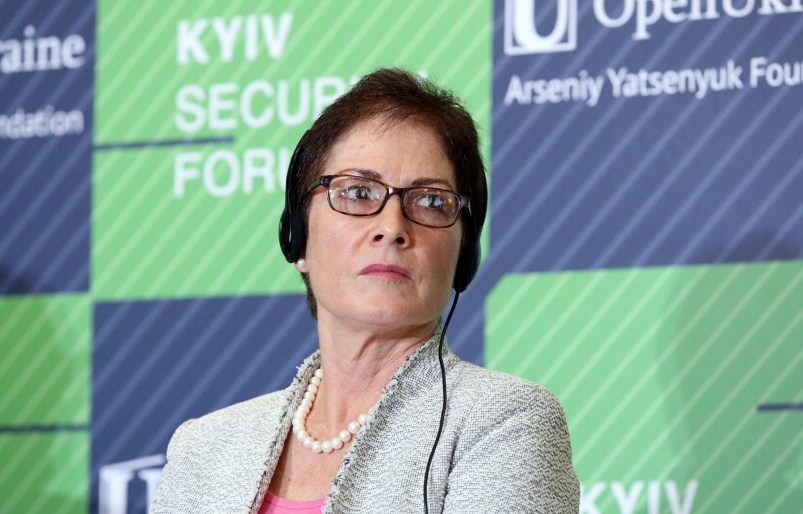In newly released testimony, the ousted U.S. ambassador to Ukraine told Congress about how she first learned of the smears being peddled against her and how her requests that the State Department publicly back her up went unfulfilled.
Marie Yovanovitch is a crucial witness for House Democrats as they continue their impeachment probe into Rudy Giuliani’s Ukraine pressure campaign on behalf of President Trump. The transcript of her closed door interview last month was released Monday.
Yovanovitch was ultimately removed from the role in May, several weeks before Trump explicitly told Ukraine President Volodymyr Zelensky that he wanted investigations opened into his political rivals.
In her testimony, Yovanovitch was able to lay out for investigators the early stages of the Ukraine pressure campaign and how her State Department counterparts in the U.S. struggled to respond to it.
Yovanovitch first heard that Giuliani was trying to smear her in late 2018.
The first hints that Giuliani was up to something in Ukraine came to Yovonovich in November and December of 2018, when she heard that Giuliani was meeting with Yuriy Lutsenko, then the top prosecutor in the country.


Yovanovitch later testified that she learned from embassy staff that “basically there had been a number of meetings between Mr. Lutsenko and Mayor Giuliani, and that they were looking, I should say that Mr. Lutsenko was looking, to hurt me in the U.S.”
By around February, Yovanovitch said, a senior Ukraine official named Arsen Avakov told her he “was very concerned, and told me I really needed to watch my back.”
The official flagged for Yovanovitch that Giuliani, along with his now-indicted middleman Lev Parnas and Igor Fruman, were meeting with Lutsenko and “were interested in having a different ambassador at post,” according to her testimony.
She thought it was “exceedingly strange,” and testified that, while she understood that the men had business interests in Ukraine, nobody at the embassy had met Parnas and Fruman. Avakov told Yovanivith that Giuliani reached out to him in early 2019, according to her testimony.

Avakov thought Giuliani’s outreach was “dangerous,” Yovanovitch said, because Ukraine has had bipartisan support in America and to “start kind of getting into U.S. politics, into U.S. domestic politics, was a dangerous place for Ukraine to be.”
Lutsenko wanted meetings with top U.S. officials, including the FBI Director and Attorney General.
Yovonovitch said Lutsenko targeted her in part because she took a hardline on his failure to root out corruption, and in part, because she refused to set up meetings for him with top U.S. officials like the attorney general and FBI director.

“We did work with the [Lutsenko’s] office, but he wanted us to work with him in different ways, you know, and that we didn’t have a closer relationship, and that I was not facilitating trips for him to the United States with our cabinet members, when there was, frankly, nothing to talk about because he wasn’t a good partner for us,” she testified, while noting the proper channel was for him to meet with the FBI’s liaison in the embassy.
“He clearly wanted to work around the system, where I think there’s less transparency, there are more opportunities to, you know, kind of fiddle the system, shall we say.”

Yovanovitch later speculated that Lustenko “was hoping that maybe, as a result of providing information that is of interest to Mr. Giulinai, that maybe there could be an endorsement” of President Petro Poroshenko, the Ukrainian who appointed Lutsenko who went on to lose the 2019 election.
The State Department was ‘shocked’ to hear about Giuliani’s Ukraine activity.
Yovanovitch reported to the State Department what she had heard about Guilani’s activities, and she said the Department was “shocked.”

She said she spoke to either Phil Reeker or George Kent about it. Both are top State Department officials with Ukraine in their portfolios. And those early communications likely by phone call or video teleconference because it “felt too political” to put in a cable, Yovanovitch said.
Guilani’s demands for probes were “unprecedented.”
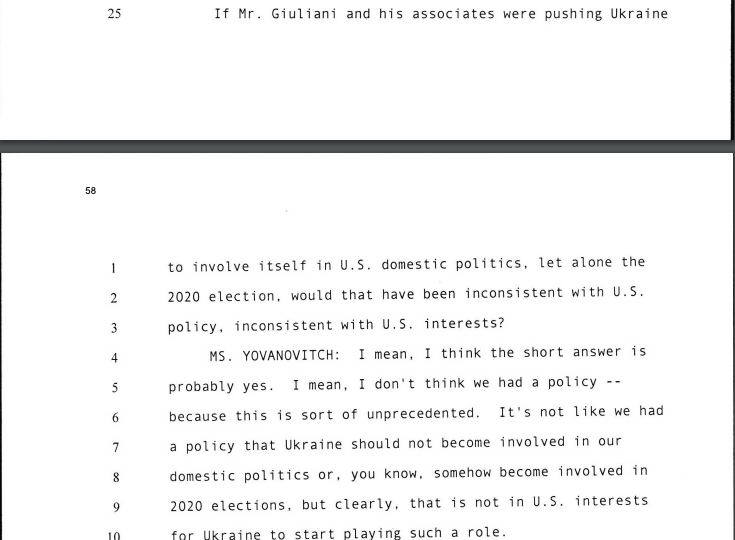
After Trump Jr. attacked her, she sought unsuccessfully for Pompeo to back her up.
In late March, State Department Under Secretary David Hale asked her to put in classified email her “understanding of what was going on,” according to her testimony, after Donald Trump Jr. tweeted an attack on her.
“If you have the President’s son saying you know, we need to pull these clowns, or however he referred to me, it makes it hard to be a credible ambassador in a country,” she told Congress, adding that she wanted a statement from Secretary of State Mike Pompeo backing her up.
 No statement was ever issued, nor did she speak to Pompeo directly about the matter, she said. Reeker relayed to her the responses from the “seventh floor” — referring to where the offices of Pompeo and his closest aides are in the State Department.
No statement was ever issued, nor did she speak to Pompeo directly about the matter, she said. Reeker relayed to her the responses from the “seventh floor” — referring to where the offices of Pompeo and his closest aides are in the State Department.
Yovnoavitch said she was told that there was “caution” about putting any kind a statement, because it could be “undermined” by the President.
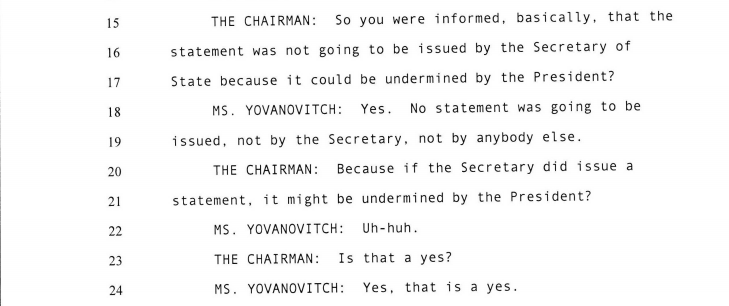
As she was about to be removed, Yovanovitch got a heads up about White House’s “nervousness”
Yovanovitch said her first indication she was being recalled from Kyiv came in a phone call a few days after a Trump phone call with Zelensky in late April.
In the phone call to her, State Department director general Carol Perez that there was “nervousness” on the seventh floor and “up the street,” a reference, Yovanovitch said, to the White House.
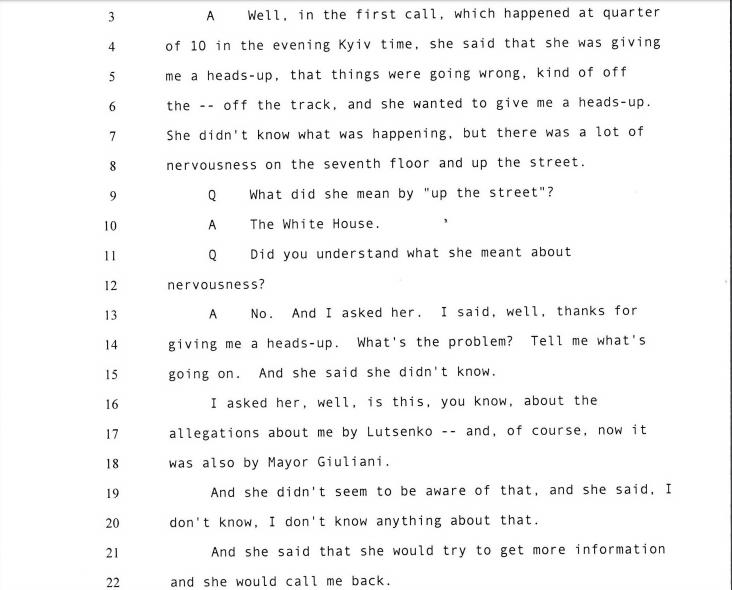
At the time, she believed she would stay in her post at least through July 4, as part of her original plan for departure, and that she had heard of no issues, even from the seventh floor, about her performance.
Yovanovitch was told that Pompeo or his inner circle called Sean Hannity to tamp down the allegations against her.
With no public statement coming to defending her, Yovanovitch was told instead that either Pompeo or someone from his circle was going to call Fox News host Sean Hannity about the smears being peddled about her. The call happened after The Hill’s conspiracy-mongerer John Solomon published a piece with false claims about her in March.
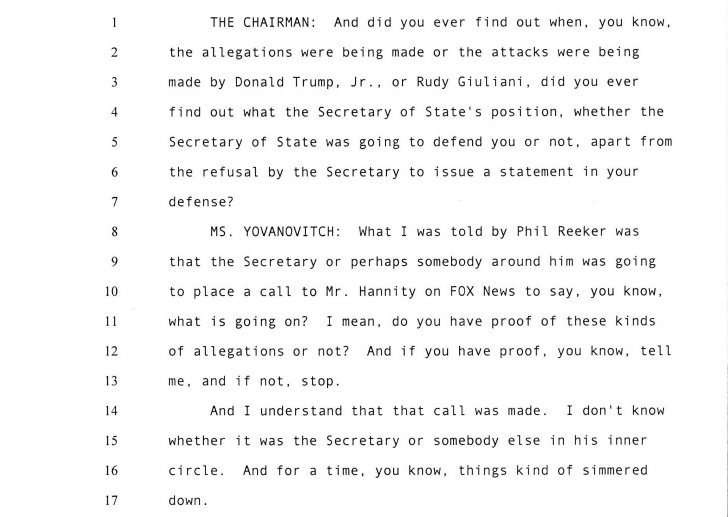
Yovanovitch said she never got a full readout from the purported Hannity call and was only told that it happened. The allegations seemed to have “simmered down” after the call, based on the media monitoring that was happening, she said.
Yovanovitch was initially told she was being called back for her “security.”
About an hour after the initial heads up, Perez called Yovanovitch back with the directive that she get on the next plane to Washington.

Perez couldn’t tell her how long she would be in Washington, and once she arrived, having taken a Friday flight, Yovanonitch didn’t get an explanation from anyone at State until that Monday afternoon.
There, Reeker told her that the President had wanted her gone since the summer of 2018.
She then met with Deputy Secretary Sullivan, who told her, according to her testimony, that “was sorry this was all happening, that the President had lost confidence, and I would need to depart my post.”
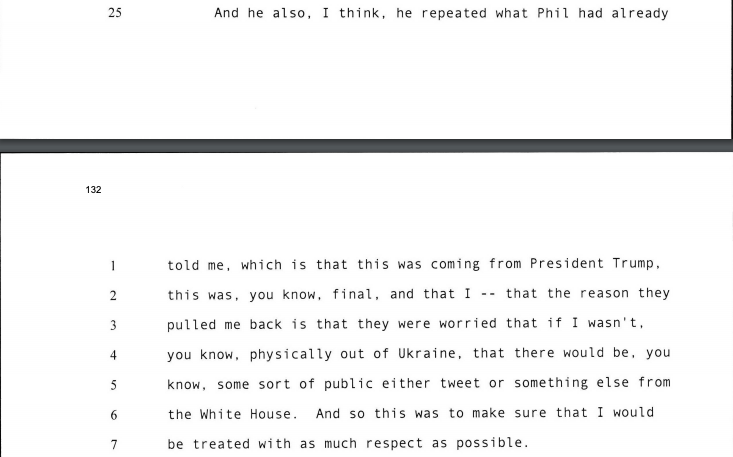
Pompeo’s top counselor would not accept a meeting with her.
Yovanovich never spoke to Pompeo about all of this, but sought to meet with State Department Counselor Ulrich Brechbuhl, whom should understood to be Reeker’s point person on handling the matter.
“He didn’t accept the meeting request,” she said.
Yovanovitch felt threatened by what Trump said about her on July 25 call.
Yovanovitch was read a line from the rough transcript of Trump’s July 25 call with Zelensky, in which Trump said that Yovanovitch was “going to go through some things.”
Yovanonivitch said she is still concerned by the remark, and when asked, confirmed she felt threatened.
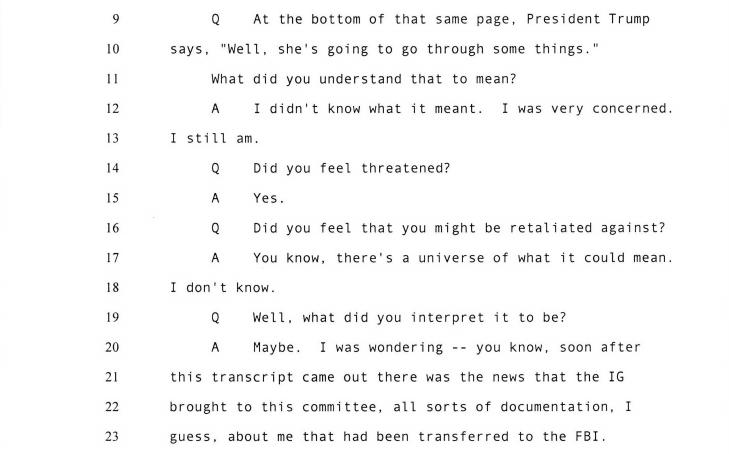
She said she feels worried about her employment and her pension, and that her friends are worried about her personal safety, though she’s not worried about that.
Sondland suggested Yovanovitch push back on the smears by tweeting her support of Trump.
Yovanovitch said she spoke to Ambassador Gordon Sondland about the false attacks against her. Sondland, a Trump-donor who was the U.S. ambassador to the EU, was deputized by Trump to help lead his policy in Ukraine, despite Ukraine not being a member of the EU.

She said she did not follow that advice in part because the State Department had not publicly defended her.
“I just didn’t see that there would be any advantage to publicly taking on a fight with those who were criticizing me in the United States,” she said.
She later elaborated on what Sondland told her. “I have to admit that the advice took me aback,” she told Congress.



